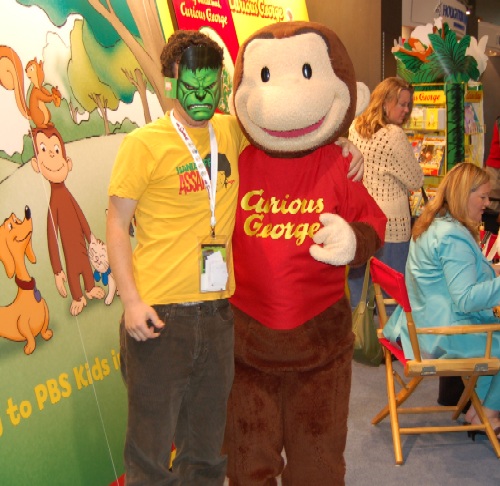Month / May 2006
So Who Will They Shut Out of the Country Next?
AIM Magazine: “London rapper M.I.A. has been denied a visa to visit or work in the USA by immigration officials, AIM magazine has learnt. Sources close to the British Sri-Lankan MC said that her lawyers are frantically trying to resolve the situation. No one from her record company had returned messages to comment at the time of publication.”
Just When You Think Nothing Can Shock You Anymore
Unbelievable. (via MeFi)
A Contrarian Take on Mockingbird
Thomas Mallon on Harper Lee: “More troublesome than the dialogue, Lee’s narrative voice is a wildly unstable compound, a forced mixture—sometimes in the same sentence—of Scout’s very young perspective and a fully adult one. Phrases like ‘throughout my early life’ and ‘when we were small’ serve only to jar us out of a past that we’ve already been seeing, quite clearly, through the eyes of the little girl. Information that has been established gets repeated, and the book’s sentences are occasionally so clumsy that a reader can’t visualize the action before being asked to picture its opposite: ‘A flash of plain fear was going out of [Atticus’s] eyes, but returned when Dill and Jem wriggled into the light.'”
So I Guess Hack Novelists Live Hackneyed Lives?
Houston Chronicle: “‘When college is over, you’ll think about it for the rest of your life,’ he said Saturday. Grisham joked that adulthood is overrated, and said professional life is stressful and unhealthy. One solution, he said, is to stay in school.”
Let me set John Grisham, Esquire straight. The telltale sign that Jay Gatsby is one unbearably sad dude:
“Can’t repeat the past?” he cried incredulously. “Why of course you can!”
Bob Hoover Covers the Real Issues
Where many other bloggers have offered specific BEA reports of what transpired during last week (meaning, you know, actual encounters with human beings and the like), leave it to book editor-turned-blogger Bob Hoover to expose the real issues, which is apparently not the confluence of authors and publishers and exhibitors, nor the sightings or the conversations, but the food served at all the various parties (see May 23, 2006 entry; again, permalink unprovided):
The gold standard (for me, at least) was the HarperCollins affair at the Smithsonian Castle Saturday night where the prosciutto ($23 a pound where I come from) was spread out in yards like ribbon.
Well, thank you, Bob. So glad you bothered to go into detail on the interesting social climate.
Of course, it’s possible that Bob’s still getting his sea legs at this blogging thing. Then again, Bob confesses that he had intelligence of the Knopf party time and location, but didn’t bother to storm the gates. I must posit something: Would a real journalist refrain from crashing the gates?
Certainly Jeremy “VIP Mothefucker Ringleader” Lassen had no such qualms.
Clearly the Gray Lady Hasn’t Heard of TiVo
New York Times Corrections: “An article in The Arts on Thursday about plans for the fall television season misstated the time ‘The New Adventures of Old Christine’ will be shown on CBS on Monday nights. It is 9:30, not 9.”
Summer Reading: It’s All About Checking Your Brain In?
As Mr. Orthofer has observed, it’s Pulp Fiction Week at Slate. Of course, by “pulp,” Slate refers not to Robert E. Howard, Lester Dent or Erle Stanley Gardner, but to distinguished authors like Dashiel Hammett. (I suppose Stephen Crane, who self-published Maggie: A Girl of the Streets in part to cash in on the lurid popular fiction markets of the time, must be declared a disreputable “pulp” author as well. Never mind that Maggie is also one of the key novels of its time that dares to chronicle prostitutes and street life. But I digress.)
Further, Slate has asked a list of luminaries to provide their favorite beach books. Among some of the more interesting revelations:
- Rick Moody recommends the Motley Crue autobiography.
- New Yorker critic Joan Acocella actually recommends The Da Vinci Code.
- Michael Kinsley believes Evelyn Waugh to be “pretty mindless” and considers Trollope “the most mindless of the big, fat…19th-century brits.”
- Joyce Carol Oates avoids beaches and thus evades the “beach book” question.
- A “recommendation” from George Saunders that must be read.
[UPDATE: One damn thing that I missed (and surprisingly Sarvas) and that Sarah caught was John Banville on the Parker novels.]
Yannick Murphy in the LBC House
I’m still trying to organize the DC booty and all the damn equipment I hauled there and back. So I’m slightly slow on the draw, but Yannick Murphy can be found at the LBC this week. There’s also some lively conversation with Ms. Tangerine Muumuu, Segundo’s Prime Crush and Stylin’ Craig.
NYT Obits Staff: Asleep at the Wheel?
If Sam Tanenhaus’s inflated self-importance weren’t ridiculous enough, consider how ineffectual the Gray Lady has been these days at noting the passing of vital literary authors. For a newspaper that has a stockpile of prewritten obits outnumbering the Associated Press and that apparently has the resources to videotape seminal geezers just before they kick the bucket, one wonders how much work is actually going on at Times headquarters. Is the obit staff malingering, perhaps passing the hours playing Minesweeper? Or is there so much fact-checking of fact-checking of fact-checking going on that the NYT obit staffers are precluded from performing their jobs?
As readers here may recall, the New York Times took a week and a half to note Octavia Butler’s passing, weighing in four days after all of the other media outlets had filed their articles. And, as pointed out by Dan Green, nearly one week after Sorrentino’s death, they have completely failed to note it, save through an inconsequential blurb. In fact, the Los Angeles Times, which has perhaps half the resources and twice the uncertanity that the Gray Lady does, has done a far more promising job, obtaining quotes from Don DeLillo and Christopher Sorrentino and giving its readers a very thorough overview of who Sorrentino was, even for those unfamiliar with his work.
But the New York Times, which Tanenhaus recently declared at BookExpo the nation’s best newspaper for literary coverage, can’t even be bothered to register more than a peep for a man considered by many academics and literary enthusiasts as one of the greatest experimental novelists of the twentieth century. (Ironically, Sorrentino’s Mulligan Stew was named by the Times as one of the best books of 1979. While this was mentioned in the Gray Lady blurb, one would think such past accolades would justify substantial coverage.) As such, how can any serious intellectual or cultural enthusiast take the Times seriously as a arbiter or a gatekeeper, much less a newspaper capable of delivering current news to the public in a timely fashion?
Perhaps the answer might reside within John C. Ball and Jill Jonnes’ book Fame at Last, which took apart 10,000 obituaries published by the Gray Lady and found, much like Tanenhaus’s stag party approach to assigning reviewers, that the majority of the obits were (guess what!) allocated to men — specifically, Caucasian men of affluence.
One might argue with the exclusion and/or deferral of Butler and Sorrentino that this elitism carries over to writers. If you have darker skin, if you don’t write male menopause novels, and if you dare to try something groundbreaking, then your chances of being recognized are slim to none.
So let’s assume that the Times gets its act together and starts taking the time to fact-check and recognize cultural luminaries outside of its rigid boundaries of Important Figures. Can a newspaper which reports news long after every other outlet remain a viable newspaper in an era with nearly unlimited conduits for immediate reporting? That might have worked before the Internet, but last I heard, it was the 21st century and the people wanted their news online. Which presumably insinuates a certain immediacy.
Perhaps Chris Anderson’s suggestion that the era of the blockbuster is over applies to the Times‘ failed timeliness. The Times would rather waste its column inches on silly infograph-laden articles about people working out at the gym (do such articles really attract newspaper readers?) rather than report “the news that’s fit to print.” I’ll play the devil’s advocate and suggest that perhaps it was the “fit” portion of that slogan that the Style editor had in mind when he assigned Guy Trebay that article. Even so, a newspaper that has its staffers publicly declaring it today’s cultural apotheosis should have internal coordination between sections (here, Books and Obits), regularly demonstrate a variegated sweep of what’s happening in the cultural world and maintain an internal organization structure which ensures the timely turnout of news. Anything less is a corpulent corpse ready to collapse under the weight of its own bier.
So Was BEA Worth It?
Yes and no. On one hand, it was a delight to meet up with various litbloggers, editors, publishing heads and writers. (I even got a chance to talk with Paul Slovak.) But as Miss Snark put it before all the craziness, “BEA will break your heart.”
If you have every desire to see so many fantastic books drowned out by boisterous arrays of people standing in line for the likes of Robert Duvall and if you soak up marketing terminology the way that a vacationer throws a damp cloth on his head on a summer day, then BEA is most certainly your thing. If you absolutely must have that galley of Lay of the Land a few weeks before everyone else, then by all means hie away. But for any self-respecting literary journalist, these are easily obtained through the mail. When I observed people standing by the Night Shade booth and made a few passionate endorsements of M. John Harrison to people wandering the floor, I found that very few people actually cared about the quality of the books proffered. They were more interested in scoring free books or meaningless autographs with celebrities. When D’Ambrosio and Link offered thoughtful comments about the current state of the short story, an inevitable “What are the bennies?” question was asked.
Granted, it is vital for everyone to understand that publishing is a business. But it is certainly not just about money. At least not for those who still care about books or for those who realize that publishing is second only to Hollywood in its utterly unsound business model, where lavish advances are thrown into the ether and books are dumped into the market often without a concentrated or targeted plan.
It takes a certain type of person to come to terms with that reality. And I would argue that for literary enthusiasts and champions, wearing multiple hats like this isn’t an easy thing. (It certainly wasn’t easy for me.)
So was it worth it? Well, it was worth every penny to learn that this man has almost no sense of humor whatsoever:
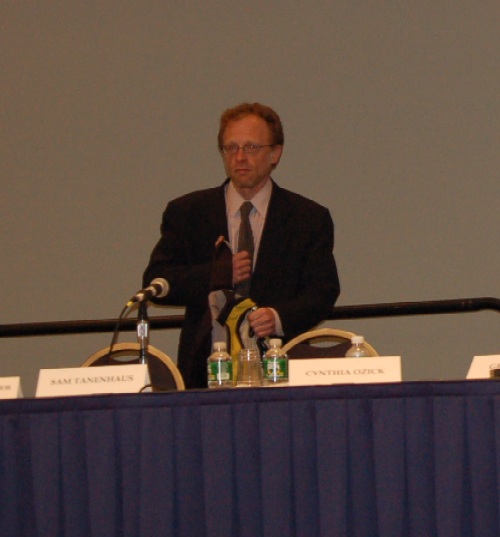
Rupert Thomson Interview
Maud has put up her interview with Rupert Thomson. Do check it out. Thomson is one of the world’s most underrated novelists and is highly worthy of your attention (this interview is a start). And if you haven’t read The Book of Revelation, you’re seriously missing out.
BEA: Embracing the Short Story Panel
[EDITOR’S NOTE: A momentary lens malfunction (i.e., profound idiocy on my part) prevented me from taking usable photos of this panel.]
Moderator: Brigid Hughes
Participants: Charles D’Ambrosio, Kelly Link, John Freeman, Rick Simonson
It was with the wholly solipsistic intention of meeting D’Ambrosio and Link that I attended the Short Story panel. Not knowing that it was being moderated by Hughes, it was also a pleasant suprise to meet her too. Of course, due to slight time mismanagement on my end (clearly I’m not as circumspect as Sarvas on this score), I ended up getting in a little later than expected.
When I arrived, D’Ambrosio, dressed in a denim jacket if I am to believe my notes and my extremely exhausted memory banks, came across as the most talkative of the four. He frequently saw the short story’s future with the kids he was teaching, pointing out that a lot of his students were secretly writing novels.
Link pointed out that she grew up reading short story collections (particularly ghost stories) and that reading a short story collection all the way through very much informed her current writing. She said that she was shocked when she learned that people read short stories and felt that the writer needed to be stubborn enough to resist the impulse of workshops.
D’Ambrosio said that he won’t show his work to anyone and noted that writing was about being courageous enough to make mistakes. There is the danger of too much input.
Freeman cited an example from George Saunders, noting that Saunders’ description of lab cats dying in one of his short stories was something that couldn’t be tried in a novel and provoke the same feeling. There is a troubling closure in novels, where as a short story collection allows a writer to riff on a theme.
Simonson, a bookseller for the Elliott Bay Book Company, pointed out that book club peole never asked if Amy Tan’s The Joy Luck Club was a series of stories or a novel. They simply accepted it as a work of fiction.
There was some discussion of whether trusted old dogs like John Cheever will still viable among today’s youth. D’Ambrosio pointed out that for some people, Cheever is new to them.
Hughes remarked that Link had insisted that an excerpt of “Origin Story” (her contribution to the first issue of A Public Space) be available online. Link noted that this was consistent with her desire to make a good deal of her stories available online. While more people have downloaded the stories than bought the book, she felt that this was a positive step.
When Hughes pointed out that literary agents went out of their way to avoid short story collections, Link noted that they can do well with short story collections. There is a niche audience. Many of the people that Link has met act as if they’re embarassed when they confess that they enjoy short story collections. Simonson added that he’s observed people reading around in small presses, forming a hunter-gatherer society of their own.
D’Ambrosio pointed out that there was a considerable advantage with short story collections because you don’t really need an agent. Simonson confessed that he felt uncomfortable with the idea of providing short stories for free online, feeling that it’s a bit like downloading music for free.
There was some conversation about pulp and whether or not it’s a bad thing. Hughes confessed that she had prejudices about picking up books in the science fiction section and wished that “she had known about certain authors,” but Link remarked that she rejected the literary vs. nonliterary label.
D’Ambrosio remarked that his parents were “not literary people,” but they had Updike and Cheever in their libraries
Link said that anyone interested in seeing tomorrow’s voices should subscribe to many magazines, since, with the constant rollover of issues, it’s easy to miss the good stuff.
At the close of the panel, while I didn’t share a drink with D’Ambrosio, I did find him to be a thoughtful and personable guy. I also discovered the extremely hilarious manner in which he had stumbled upon my blog, which you’ll have to ask me about in person. Let’s just say that I’m indebted to a party who shall remain unnamed who filled in the missing details.
As for Link, she too was generous, although a tad overextended. But I did get a chance to talk with her a little bit over dinner on Saturday night with the so-called speculative fiction/litblogging cadre. At that same dinner, Jeremy Lassen, upon learning that I had not only procured but read the UK edition of Tricia Sullivan’s Maul, unleashed one of the most energetic solilioquys I’ve ever seen about the publishing industries, getting so worked up that he allowed his dinner to get cold. (He also demonstrated some delightfully impish effrontery by heading straight into the PGW party and declaring himself “VIP” while a line clamored well up the street. Hopefully, I’ll hook up with him soon. I learned also that he’s operating out of San Francisco.) The nice thing about the Short Story panel crowd, compared with some of the more pompous and less self-effacing authors I saw strutting their wares on the floor, was that the Lassen/D’Ambrosio/Link crowd, to my eye, had genuine passion about the craft and importance of writing that transcended the literary-genre debate that’s quite the rage with the snobs these days.
It’s not about the business or the labels. It’s the writing, stupid.
Birnbaum Alert
Robert Birnbaum talks with Julia Alvarez.
BEA: Syndicating Litblogs Panel
Even on scant sleep, I still had considerably more stamina on Friday than I did on Sunday. I designated Friday as the last day I would be attending panels.
The first of two Friday panels I attended was the unfortunately named Syndicating Litblog Book Reviews panel, which featured Sarah Weinman and served as a congregation point for the many litbloggers running around the floor.
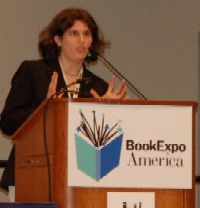 Sarah offered a brief background on how she got involved in the litblogging scene, noting that it grew out of her procrastinating on her master’s thesis. She then expatiated on what blogs offer that print media does not: freedom, space and voice. Litblogs have managed to take advantage of the shrinking review space in newspapers, albeit not at the expense of courting controversy (e.g., L’Affair Bob Hoover). Apparently, the notorious and silly Bob Hoover (see May 21, 2006 entry; permalink unavailable) may have been in attendance. (And had I known Hoover was going to be there, I would have educated the man myself and strongly urged him to loosen his tie.)
Sarah offered a brief background on how she got involved in the litblogging scene, noting that it grew out of her procrastinating on her master’s thesis. She then expatiated on what blogs offer that print media does not: freedom, space and voice. Litblogs have managed to take advantage of the shrinking review space in newspapers, albeit not at the expense of courting controversy (e.g., L’Affair Bob Hoover). Apparently, the notorious and silly Bob Hoover (see May 21, 2006 entry; permalink unavailable) may have been in attendance. (And had I known Hoover was going to be there, I would have educated the man myself and strongly urged him to loosen his tie.)
Sarah then went into the question of how publicists could reach litbloggers, a subject that was taken up with considerable amusement later (of which more anon) and singled Freakanomics as a book outside of her interest that she had read and lauded. She suggested that publishers could do things for blogs that they blogs did for publishers. Bud Parr’s Metaxucafe was cited as an example.
But the subject soon steered well off the path of syndication. At this point, it soon became hilariously apparent that, with a few exceptions, the only people attending the panel were litbloggers and publicists. And there then came a conversational free-for-all from the floor in which business cards were exchanged and concepts were elucidated by both parties.
One of the very helpful ideas that came up was for a master list of addresses for the publicists, perhaps with detailed interests that spell out what any given litblogger might be interested in. After all, even when the publicist carefully targets a litblogger’s email, there is often no response from the litblogger’s end. I found myself walking away from the panel with some sympathy for the publicists. After all, who has the time to wade through all of the many litblogs but the intensely febrile? I missed Kevin Smokler’s RSS feed panel (and would have attended, had I known Smokler was going to be there) and have only an inkling of what transpired, but educating the publishing industry about the technology behind how we operate is certainly a start.
One of the ideas tossed around at BEA in various conversations (which originated from Carolyn Kellogg) was a litblogger’s conference, a concept that, coincidentally enough, was also recently taken up by Erin. In one of his BEA wrap-ups, C. Max Magee has suggested that “the relationship between litbloggers and the publishing industry is ill-defined.” And I happen to agree with him. Since litbloggers often operate, for the most part, off the corporate grid and are not necessarily driven by profit, perhaps a litblog conference, ideally something that prioritizes people above marketing terms, might be a conduit to aid publishers, litbloggers, publicists, advertisers and any interested parties in figuring out just what we’re all doing here.
One major difference I observed in this year’s BEA (compared to last year) is that litblogs are no longer a mystery to publishers. They know who we are. They know that we are making some dent in awareness of books and, perhaps inadvertently, sales. And in Coffee House’s case, they’re using the LBC win to profile their books on the floor. But we are operating very much outside the publishing industry and are decidedly more people-centric than dinero-centric. I’m not entirely certain that a BEA panel will help to smooth over the divide — in large part because questions concerning the inevitable monetization of litblogs (for those willing) remain largely unanswered and unstandardized, with varying degrees of acceptance and dissension.
Should the BEA decide to have another litblogging panel, I think a helpful one would involve “The Future of Litblogging: Business Models vs. Passion,” getting two litbloggers who would never provide advertising with two litbloggers who have no problem featuring banners and the like on their site. (And I’d be happy to moderate.) Perhaps lively and respectful disagreement would allow the publishing industry to understand our motivations, comprehend that there are differing approaches to litblogs, and parse some of the underlying complexities. One thing’s for sure: as a medium, the litblog isn’t going away anytime soon.
If We’re A Bit Slow on the Email Draw…
…here’s why.

Just Got In
I’m back at Chez Mabuse. I’m sitting on hours of audio and pages of notes. Bear with me while processing kicks in over the next few days.
Post-Tired BEA Syndrome (PTBEAS)
About to check out of the hotel and catch a plane. Even though I grabbed more than six hours of sleep last night (the most sleep I’ve had in a week), I’m quite ready to plummet. If there’s wi-fi at the airport, I will try and offer one of the many reports to be seen eventually on these pages.
There will also be podcasts. SEVERAL podcasts.
Ecco’s Daniel Halpern Parleys with Anderson Cooper
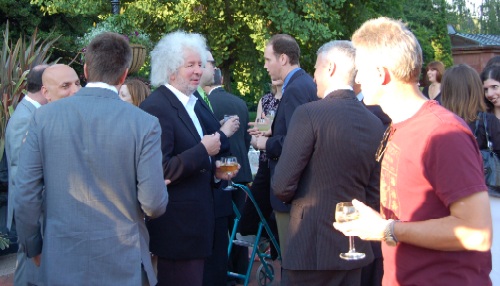
Matt Cheney & Kelly Link: Consummate Professionals
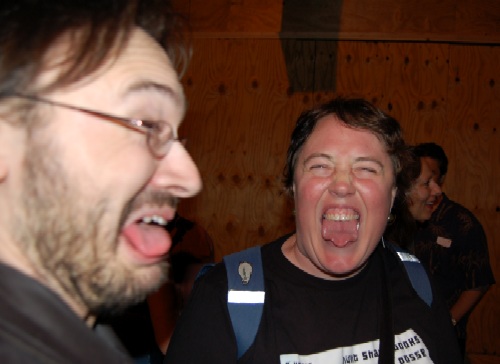
Lassen Corners Dalkey Archive’s Chad Post
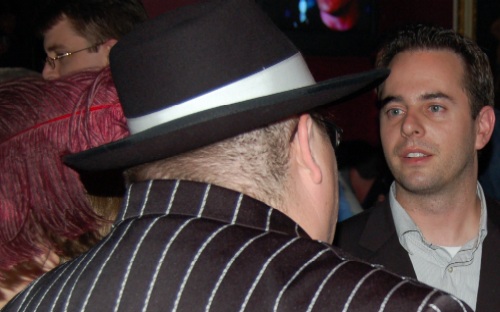
The Speculative Fiction/Litblogging Cadre Hits Consortium
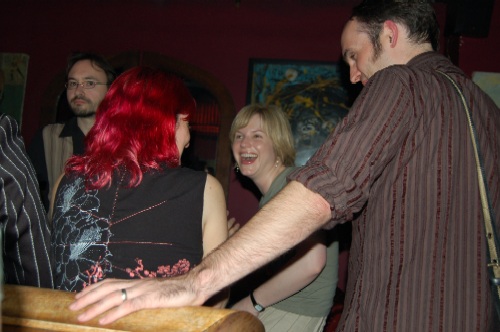
Matt Cheney Vants to Be Alone!
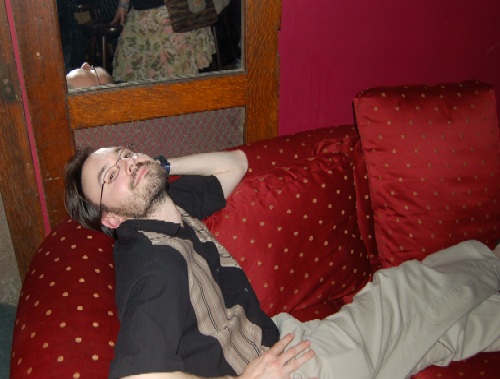
Gwenda Bond and Night Shade Books Badass Jeremy Lassen
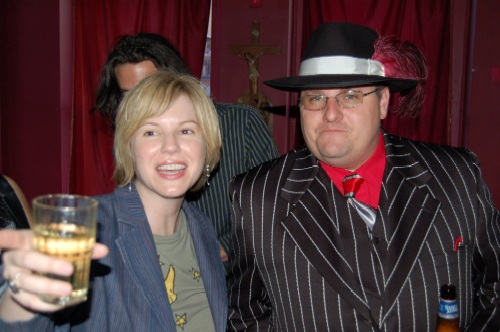
Christopher Moore Amuses Sarah Weinman with Shrubbery Impression
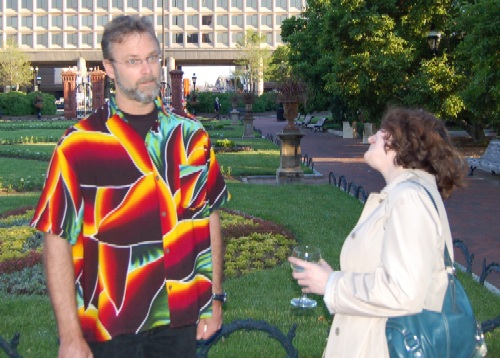
At the HarperCollins Party, It Was All In How You Carried Yourself
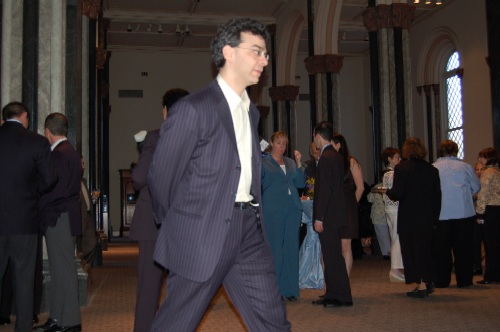
Pinky Espies Astronaut

Thomas Chong
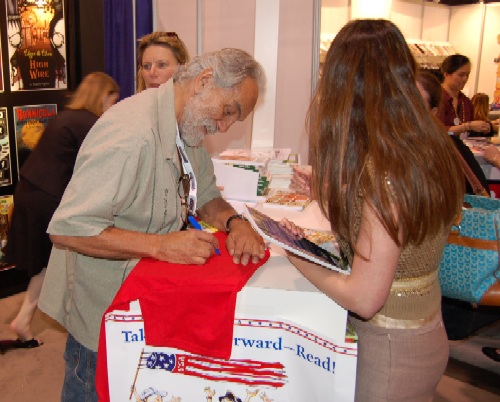
Spidey Seeks Attention
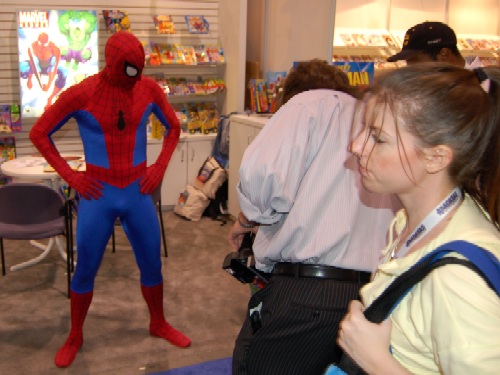
McSweeney’s Eli Horowitz & Curious George
